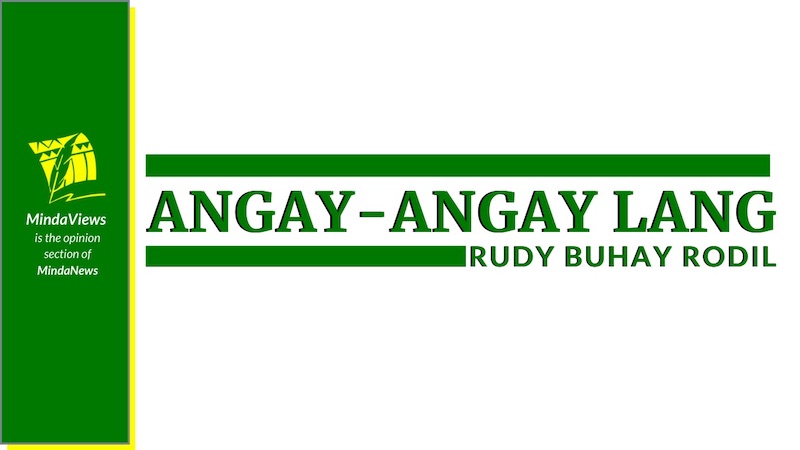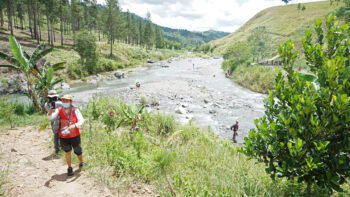
2nd of 18 parts
(This is a revised version of the book “KALINAW MINDANAW: The Story of the GRP-MNLF Peace Process, 1975-1996” published in 2000)
Chapter 1. Why the Impulse to Negotiate?
Introduction
We use peace process in this book to mean the peace talks between the Philippine government (GRP) and the Moro National Liberation Front (MNLF), both formal and informal. The process started on January 18, 1975, and ended on September 2, 1996. This is a total of roughly 21 years and nine months.
Until today, we have no way of determining what exactly brought the GRP and the MNLF to the negotiating table. The most that we are able to put together are circumstantial evidence, not the admitted motives of the principals.
RP Refused Assistance by US
On the part of government, we are aware that at one point in 1973 during its war with the MNLF, the Armed Forces (of the Philippines) ran out of ammunition. Since the American government allegedly refused to lend assistance, the Philippine government had to buy the required war materiel from other countries. This must have constituted a substantial drain on foreign reserves. Was this part of the reason why the country experienced a 48% inflation in 1974?
The Arab Oil Embargo
There was also the oil embargo. During the Arab-Israeli war in 1973 the Organization of Arab Petroleum Exporting Countries (OAPEC) decided to impose an oil embargo upon all countries supporting Israel — the Philippines was one of them. The country at that time had only three months supply of crude oil and it was getting 93.3% of total energy demands from two Arab States, 57% and 36%, respectively, from Saudi Arabia and Kuwait, both of which were enemies of Israel and founding members of OAPEC. Saudi Arabia was also elected member of the Quadripartite Ministerial Committee created by the Organization of Islamic Conference (OIC) in March of that same year to oversee the welfare of the Muslims in Southern Philippines.
The decision to impose the oil embargo was made on October 17, 1973 at the conference attended by ten oil ministers of OAPEC members, held in Kuwait. More specifically, each Arab oil exporting country would immediately cut its oil production by no less than five percent per month until such time that the international community compel Israel to relinquish Israeli-occupied Arab territories or until each oil producing Arab country reaches the point where its economy does not permit of another reduction without detriment to its national and Arab obligations.
The political objectives of the Arab countries for this move were two-fold, (a) the liberation of the Arab territories occupied by Israel in the 1967 war, and (b) the restoration of the legitimate rights of the Palestinian people.
At an earlier meeting in Kuwait, on the same day, six members representing OAPEC, namely, Iran, Iraq, Saudi Arabia, Kuwait, Qatar and Abu Dhabi decided to increase the oil prices from $3.1 to $5.11 per barrel. The decision was allegedly non-political, arrived at on the basis of the market force of supply and demand. But there is no question that it complemented the political decision to use of oil embargo as a weapon of the war.
New RP Policy on Middle East Question
President Marcos quickly and decisively responded to the embargo. He issued three major statements containing a new official Philippine policy with respect to the Middle East Question, unmistakably supportive of the Arab position. On October 21, 1973, he released a statement to all UN members urging them to do everything appropriate to help create the necessary conditions for a just solution to the Middle East conflict. His reply to the speech of Abdel Moneim Zaki El-Shinawi, Ambassador of the Arab Republic of Egypt to the Philippines when the latter presented his credentials on November 8 at Malacañang had the same content.
The substance of these statements were all embodied in the November 18 declaration which was delivered in support of the UN Security Council Resolution No. 242 on November 22, 1967, a copy of which was personally delivered by no less than Foreign Affairs Secretary Carlos P. Romulo to the then King Faisal of Saudi Arabia on November 22, 1973. The same was delivered to all Arab embassies in Manila earlier on November 18.
This November 18 declaration which fell short of severing diplomatic relations with Israel deserves to be quoted lengthily:
Taken together, my statement of 21 October and 8 November 1973 constitute an expression, at the highest level tier of this new Philippine policy which comprised the following principal elements:
- A condemnation of forcible Israeli occupation of Arab lands which is tantamount to an act of aggression in violation of the United Nations Charter.
- The withdrawal of Israeli forces from all the occupied Arab territories in accordance with Security council Resolution 242 of 22 November 1967.
- The restoration of the legitimate rights of the people of Palestine.
While these conditions are deemed essential to the just and lasting settlement of the Middle East Question which all member states are called upon to help achieve under the auspices of the United nations, it was also a strategic move to secure the continued oil supply of the Philippines from the Middle East.
Oil Embargo Lifted
A few days after the Arab countries showed their appreciation of the Philippine position. At the Sixth Arab Summit Conference held in Algeria, Nov 26-28, 1973, they decided to exempt the Philippines along with Japan from the 5 percent oil reduction for the month of December 1973. But this was of course not enough. The full sanction would not be lifted until a month later. The task and honor of bringing about the full lifting of the embargo fell on the person of Ambassador Lininding P. Pangandaman.
Formerly a Constitutional Convention delegate from Lanao del Sur and then Comelec Commissioner, the first Muslim to be appointed to that post, Ambassador Pangandaman was appointed ambassador of Saudi Arabia at a crucial moment of Philippine history. It was the time when the GRP-MNLF war was at its peak, and there was the oil embargo that threatened to bring to a halt every machine that runs on oil in the Philippines. To say both events were issues of national significance was an understatement. He presented his credentials to the then King Faisal of Saudi Arabia on December 23, 1973. After the presentation ceremonies, he had an audience with the King for about 20 minutes. His account is worth recalling here.
I had a very difficult position at that time. Because I am a pure Muslim and here I am representing the Philippine government who is accused by the MNLF and by the enemies of committing genocide, so it was really a very hard balancing position… I told the truth. Yes, the Muslim areas are the most depressed, in fact when I left, there was still fighting going on… I told the late King Faisal. I said, Your Majesty, there is an ongoing massive economic development in the underdeveloped areas of our country. Unfortunately, most of the areas that are occupied by your brother Muslims are the undeveloped areas which are supposed to be the target areas of these development programs. Consequently, because of lack of oil, these areas cannot be developed. There are heavy equipment in the national government that cannot be transported to the south on account of the lack of oil. So, consequently, Your Majesty, it is your brother Muslims suffering also from the lack of oil… I saw an instantaneous change of expression in his face. Without any hesitation whatsoever, he said that he would see to the lifting of the embargo.
The ambassador received the final word on the lifting on December 27. He was summoned to the Foreign Ministry where the Arab Foreign Minister, as instructed, personally handed him a note from the king. At the Foreign Ministry, he asked about the content but the Foreign Minister advised him to read the note later when he was back in his embassy. Pangandaman excitedly recounts:
It was an open letter, unsealed. I opened it in the car. It was in Arabic. I cannot read Arabic. I asked my interpreter to read it. He jumped with joy.
“Sir, the King restored the oil supplies to the Philippines. He has ordered Aramco to restore the oil supply, and Aramco likewise ordered to instruct all oil majors, Caltex, Shell, Esso, all the oil majors to restore the normal oil supplies.”
So, I went to our radio, yong (this) Single Side Band, that was our means of communication, walang (no) telephone, walang (no) fax , walang (no) nothing. So, I immediately called up General Romulo, our foreign secretary that I am sending immediately this message: The oil supply has been restored.
The following day, the operator came running, saying that the President wanted to talk to me. Because I was residing at the second floor, I had to rush down to the radio room. Our brief exchanges:
Amb Pangandaman: “Good morning, Mr. President.”
Pres FM: “Yes, is this the Ambassador?”
Amb P: “Yes, Mr. President.”
Pres FM: “Congratulations for a job well done.”
Amb P: “For what, Mr. President?”
Pres FM: “I just received the message from General Romulo that you just succeeded in working out the restoration of the oil supply.”
Amb P: “Yes, Mr. President, I sent that message yesterday.”
Pres FM: “Congratulations.”
Amb P: “Any further instruction, Mr. President?”
Pres FM: Continue the good work.”
This author asked further. Was there any pre-condition in the lifting of the embargo? He replied in Tagalog: Wala, wala (no, none at all).
TOMORROW: Chapter 2. First Contact, Touching Base
(MindaViews is the opinion section of MindaNews. A peace specialist, Rudy Buhay Rodil is an active Mindanao historian and peace advocate.)







